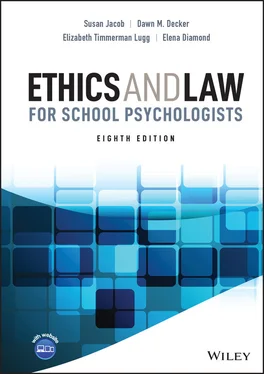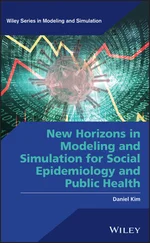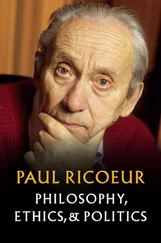Susan Jacob - Ethics and Law for School Psychologists
Здесь есть возможность читать онлайн «Susan Jacob - Ethics and Law for School Psychologists» — ознакомительный отрывок электронной книги совершенно бесплатно, а после прочтения отрывка купить полную версию. В некоторых случаях можно слушать аудио, скачать через торрент в формате fb2 и присутствует краткое содержание. Жанр: unrecognised, на английском языке. Описание произведения, (предисловие) а так же отзывы посетителей доступны на портале библиотеки ЛибКат.
- Название:Ethics and Law for School Psychologists
- Автор:
- Жанр:
- Год:неизвестен
- ISBN:нет данных
- Рейтинг книги:3 / 5. Голосов: 1
-
Избранное:Добавить в избранное
- Отзывы:
-
Ваша оценка:
- 60
- 1
- 2
- 3
- 4
- 5
Ethics and Law for School Psychologists: краткое содержание, описание и аннотация
Предлагаем к чтению аннотацию, описание, краткое содержание или предисловие (зависит от того, что написал сам автор книги «Ethics and Law for School Psychologists»). Если вы не нашли необходимую информацию о книге — напишите в комментариях, мы постараемся отыскать её.
Ethics and Law for School Psychologists
Ethics and Law for School Psychologists
Ethics and Law for School Psychologists — читать онлайн ознакомительный отрывок
Ниже представлен текст книги, разбитый по страницам. Система сохранения места последней прочитанной страницы, позволяет с удобством читать онлайн бесплатно книгу «Ethics and Law for School Psychologists», без необходимости каждый раз заново искать на чём Вы остановились. Поставьте закладку, и сможете в любой момент перейти на страницу, на которой закончили чтение.
Интервал:
Закладка:
The Court also identified three features that distinguish off-campus speech from on-campus speech in the context of regulation. First, schools do not stand in loco parentis when the student is off-campus and not at a school activity. Second, because allowing school regulation of off-campus speech would regulate student communication 24 hours a day, it could chill protected speech resulting in students being unable to speak at all. And third, the school itself has an interest in protecting a student’s unpopular expression, especially when the expression takes place off campus, because America’s public schools are the nurseries of democracy. Taken together, these three features of much off-campus speech mean that the leeway the First Amendment grants to schools in light of their special characteristics is diminished (pp. 6–8).
Like the lower courts, the Supreme Court found no evidence that Brandi’s crude off-campus Snapchat protest resulted in a “substantial disruption of school activity or a threatened harm to the rights of others that might justify the school’s action” (p. 10; here quoting Tinker ) and ruled in Brandi’s favor.
The First Amendment protections of the speech of school-employed psychologists are addressed in Chapter 12of the book. As will be seen, a tension exists between the school psychologist’s obligation to advocate for the bests interests of students and the limitations to their free speech as a public school employee.
Privacy Rights
No “right to privacy” is mentioned expressly in the Constitution. A number of different privacy rights have been carved out of the First Amendment concept of “liberty,” Fourth Amendment prohibition against unreasonable search and seizure, Fifth Amendment protections against self-incrimination, and Ninth Amendment reservation of rights to the people (Hummel et al., 1985). The courts generally have held that students have a Fourth Amendment right to be free from unreasonable search and seizure in the schools. More specifically, the courts have ruled that students have a legitimate expectation of privacy rights with regard to their person and possessions , but they have allowed a more lenient standard of “reasonable suspicion” as opposed to “probable cause” for conducting searches in school (privacy is discussed further in Chapter 3).
The right to informational privacy has been acknowledged in several Supreme Court opinions (e.g., Whalen v. Roe , 1977). A lower court described this right as protecting “the individual from government inquiry into matters in which it does not have a legitimate and proper interest” ( Eastwood v. Depart. of Corrections of State of Okl ., 1988, p. 631). However, because the Supreme Court has not provided guidance on the meaning of informational privacy , the lower courts have defined it with various broad or narrow interpretations (Waldman, 2015). The lower courts also have adopted differing tests with regard to whether an individual’s informational privacy interests have been violated by a government actor. Most, however, use a balancing test that weighs the government’s interest in the invasion of informational privacy against the individual’s privacy interests. Furthermore, “case law is also murky as to whether the informational privacy right applies to government acquisition of personal information or whether it solely covers the further disclosure of such information” (p. 708).
At least three federal circuits have ruled that minors have informational privacy rights, but the implication of these rulings for public school students and their parents is not clear (Waldman, 2015). Do such rulings provide greater informational privacy rights to students and their families than afforded by federal public education laws (e.g., Family Educational Rights and Privacy Act of 1974)? In an older court case, a federal district court ruled that parents of schoolchildren have a right to be free from the invasion of family privacy by the school ( Merriken v. Cressman , 1973). In light of contemporary concerns about the collection of extensive quantities of personally identifiable student information by schools and its disclosure to third parties (Reidenberg et al., 2013), future court decisions may provide new guidance on the appropriate balance between the school’s need for information about students and their families and the right of students and parents to be free from inquiry into matters in which the school does not have “a legitimate and proper” interest.
Freedom of Religion
The First Amendment also ensures the basic right to free exercise of religious choice, and, under the 14th Amendment, both Congress and the states are prohibited from passing laws “respecting an establishment of religion.” The First Amendment is the source of two types of church-school-state cases: those involving the use of public funds for parochial schools and those involving school policies or classroom procedures objected to on religious grounds. (For a discussion of cases involving school-sponsored prayer or other religious activities, see Russo, 2018.)
In general, court interpretations of the First Amendment suggest that the state is not allowed to provide funds directly to parochial schools. However, under the “child benefit theory,” the state may provide educational services (e.g., remedial instruction and school psychological services) for students attending parochial schools as long as those services directly aid the student, they are not used for the purpose of religious instruction, and there is no impermissible entanglement of church and state ( Agostini v. Felton , 1997; Wolman v. Walter , 1977).
In 2002, the Supreme Court decided Zelman v. Simmons-Harris , a case concerning whether the First Amendment prohibition against Congress establishing a religion prevents a state from providing tuition monies to parents and allowing them to use that aid to enroll their children in a private school of their own choosing, without regard to whether the school is religiously affiliated. In a narrow 5–4 ruling, the Court held that such school voucher plans are constitutionally permissible, so long as the money that flows to the parochial schools results from the true choice of schools by parents.
In two recent cases, the current Court has shown even greater willingness to erase distinctions for available funding between public and religious schools. In the first case, Trinity Lutheran Church of Columbia, Inc . v . Comer (2017), the Court held that disqualifying otherwise eligible recipients from a public benefit “solely because of their religious character” imposes “a penalty on the free exercise of religion that triggers the most exacting scrutiny” (p. 2015). At issue was participation in a program for playground improvement under which religious schools had been specifically barred.
In Espinoza v Montana Department of Revenue (2020), the Montana Legislature sought “to provide parental and student choice in education” (p. 2251) by enacting a scholarship program for students attending private schools. The program granted a tax credit of up to $150 to any taxpayer who donated to a participating “student scholarship organization” which then used the donations to award scholarships to children for tuition at a private school; however, religious private schools were excluded. The Court held that excluding qualified religious schools from its school scholarship program was a violation of the Free Exercise Clause of the First Amendment and therefore unconstitutional. “A State need not subsidize private education. But once a State decides to do so, it cannot disqualify some private schools solely because they are religious” (p. 2261).
Читать дальшеИнтервал:
Закладка:
Похожие книги на «Ethics and Law for School Psychologists»
Представляем Вашему вниманию похожие книги на «Ethics and Law for School Psychologists» списком для выбора. Мы отобрали схожую по названию и смыслу литературу в надежде предоставить читателям больше вариантов отыскать новые, интересные, ещё непрочитанные произведения.
Обсуждение, отзывы о книге «Ethics and Law for School Psychologists» и просто собственные мнения читателей. Оставьте ваши комментарии, напишите, что Вы думаете о произведении, его смысле или главных героях. Укажите что конкретно понравилось, а что нет, и почему Вы так считаете.












